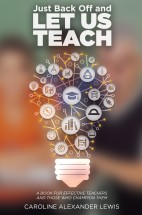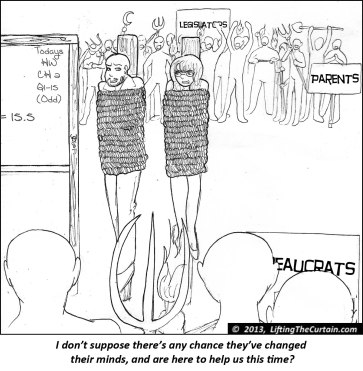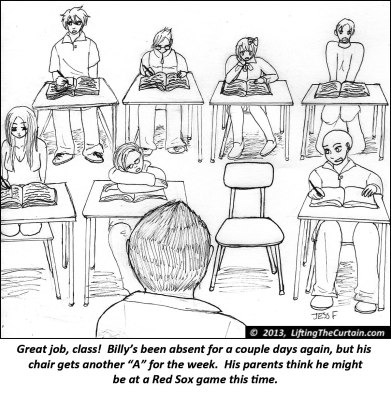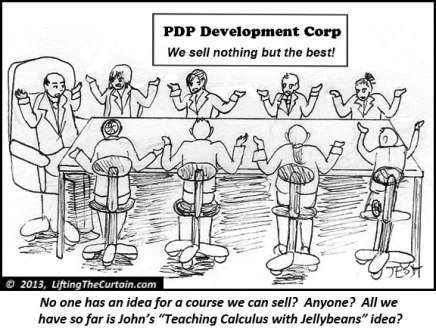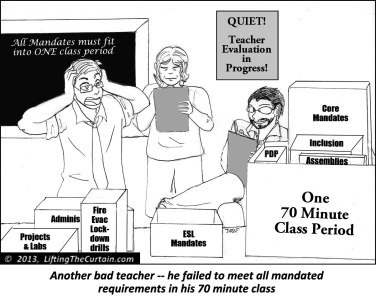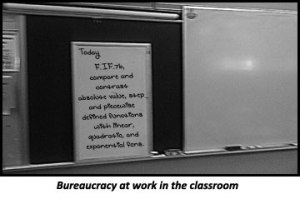An extended version of my Huffington Post blog
There is perhaps no more heated a topic in the teacher lunchroom than the role of parents in education. The overwhelming bulk of parents, even in the most challenged schools I researched, remain the best allies a teacher could ever want. But teachers are human (at least most of us), and by human nature all those good parents often get forgotten because of the negative impact and behavior of a minority (numerical minority, not demographic) of parents. If you enter the teacher lunchroom and hear heated voices, the chances are very good that at the heart of it is a parent who refused to come to an important conference about their child, or one arguing to get a grade changed, or threatening the teacher, or demanding an unneeded IEP accommodation.
Please be sure to FOLLOW our blog by clicking “follow” in the
upper right corner of this page. Following a blog is ALWAYS ANONYMOUS.
You simply will receive a confidential email when new posts are made.
The vast majority of parents – Our best allies
Prior to publication of Lifting the Curtain: The disgrace we call urban high school education, I spent three years of surveys, visits, and interviews researching urban high schools. Since then I’ve received hundreds of emails and posts on the topic. One thing is very clear – even in the most challenging high schools the majority of parents are a huge help, and are the driving force in the success of their children. A 2012 analysis in Great Britain said exceptionally well something all USA teachers know:
“A study by the Royal Economic Society, to be presented this week, finds that parental effect on test results is five times that of teachers’ influence. This comes in the wake of warnings by Sir Michael Wilshaw last week that teachers were unable to properly do their own jobs because parents were expecting them to cover their own parenting skill shortfalls and to become surrogate family for the students.”
In my research looking at parent-teacher nights, teachers reported that 87% of attendees were parents of the best students. There is tremendous cause and effect hidden in that finding – the best students succeed exactly because of the parent involvement and caring. Based upon the research, 71% of the parents are in this category – setting expectations, support, and motivation for their child that are the most wonderful gifts a parent can ever give a child.
A numerical minority – At the heart of the storm
But then there are the other parents. The tremendous negative impact just a handful of parents can have on a school and their children is staggering. A minority of 29% of the parents were found to totally dominate school conferences, conflicts, and policies. The average teacher has 3.1 difficult parent confrontations per month. Only 30% of the teachers get solid support from their administrators in parent confrontations – principals would rather have the problem “…just go away” by changing a grade or promoting a child who needs to fail. Getting support from these parents is so difficult and frustrating that in 2012 Detroit actually looked at (silly, but understandable!) making it a misdemeanor crime to skip a teacher conference.
One of the most common and frustrating statements by such parents to teachers is “…it is your job to motivate my child.” But it is not. It is the teacher’s job to reinforce and build upon the motivation the parent has already installed in the child.
Trying to teach the children of such parents becomes the impossible challenge of trying to motivate a child for 5 hours each week, while knowing the child will be in a home and non-school environment for 12-15 hours each day that works against everything we try to do. Is it any surprise that children in urban high schools do an average of just 1.5 total homework hours per week, 29% copy most homework, and 24% routinely take zeroes on homework?
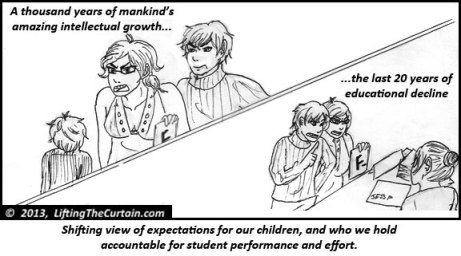
The problem is especially confrontational with special education students. SPED is a wonderful concept, a powerful benefit to those who need it, and arguably the most positive achievement of education in the past century. It absolutely is needed and is of great benefit to many students. The conflict is not about the special education students where the IEP or 504 is a crucial and invaluable asset that can positively change a child’s entire life – it is about the special education students where the IEP is a total farce.
Teachers in urban high schools sit in meetings every month across the table from parents armed with paid advocates and lawyers demanding their child be put on an IEP that the teacher, from direct experience with the child in a classroom and from years of experience knows is not needed. But this small minority of parents, armed with suspect medical reports and the threat of costly lawsuits, always achieves their goal – a “…get through school free card” for a student who is actually capable of “A” or “B” work. The head of pediatrics at Yale in 2013 wrote that there were so many bogus diagnoses of ADHD (up 41% in ten years) that they were now “…pure enhancement of children who are otherwise healthy.” (That’s doctorspeak for “a crock of poop.”) The schools cannot afford to fight the lawsuit, so the child gets the horrible “…can retake any failed test” accommodation that guaranties they do not have to worry about studying, and the destructive “…gets an ‘A’ for doing 50% of the work expected of the rest of the class” accommodation that means they do not even have to try.
For students who need these accommodations, they are a blessing. For all the students who do not, they are destructive. More than half of the students on today’s IEPs absolutely have no need for them other than the parent’s demands, and even the best special education pros are powerless to stop the abuse. These few parents, under the guise of seeking “…a fair and equal education” insure that their child never has the opportunity for that education. They have no understanding that a free ride through high school is not an act of love. And in so doing (the subject of a follow-up piece underway about SPED and inclusion) they have a severely negative impact on the entire school. Just 20-30 such parents in a school will significantly undermine the education of every student in that school. And the typical urban high school has far more than 20-30.
All parents – Our one hope for real change, if they only knew
The other role of parents in a teacher’s eyes is that parents are our one hope to fix the real issues with education that have cheated an entire generation of children out of the education they need and deserve. Only parents can demand that our legislators correct all the damage done to education by inept career DoE bureaucrats, unqualified administrators, and the unintended consequences of well-meaning legislation.
Yet it is hard for parents to see, or even believe, how different schools today are from when they were in school. The real faults in schools are so carefully hidden from view behind the curtain of the school entryway that parents have no chance to see them. In hundreds of conversations with parents, including my own children who are now grown up with children of their own, I often see the disbelief and bewilderment on their faces when I describe the realities of today’s classrooms. They were in school before standardized testing, widespread SPED that encompasses more than half of a typical urban high school population, inclusion classes, ESL, lock down drills, school violence and bullying, nutrition and allergies, social initiatives, and a host of other issues.
In a very real and understandable way, today’s parents are totally clueless about what is destroying their children’s education. Yet the drive for a solution has to come from the parents. We need to show them what has been so deliberately hidden from parents by those who profit from the disaster.
The career DoE bureaucrats, with no accountability and little or no classroom experience constantly churn out inept mandates that make it worse each year. The state and national unions ignore the desperate pleas of the local unions for help – focusing on being PACs and kingmakers – and only jumping on the bandwagon for real issues after parents have already made that issue very visible. I have watched with distaste a leader of a state teacher union finally show up to join a local union and parent protest about an issue – because that same state union was nowhere to be seen when teachers and the local union were begging for help to fix the DoE mandates that caused the issue. The legislators are all too willing to just trade more wasted funding for political donations by kicking the can down the road.
Parents are the only chance for change.
Teachers – Time and again we shoot ourselves in the foot when discussing parents
Teachers have to accept some strong criticism here, as well! In countless teacher blog articles and forum posts I read that “…parents are the problem.” Every time a teacher says that, they are being both unfair and hypocritical by leaving out a couple words. Indeed, SOME parents are PART of the problem. But most parents are still as dedicated as we were to our own children.
And by being unfair we are shooting ourselves in the foot by driving away the very people we most need to help us fix this for our children!
Why hypocritical? All of us, as teachers, are rightfully angry at way we are unfairly painted in the media because of the actions of some isolated creep, or the reprehensible actions of non-teacher administrators as in the Atlanta cheating scandal. But we fall into the trap of doing the same thing to parents. The terrible damage caused by that 29% minority is so visible to us, and so dominate in school problems, that we start to lump all parents together as “…PITBs.”
Time for an attitude and fairness check on this one, fellow teachers!
The Bottom Line
Parents are our one hope for real change. That is why a handful of us are so passionate about blogs like this, no matter what consequences and price we pay for being “troublemakers” when we speak out. We must lift the curtain for all, especially parents, to see what has happened to the education of our children.
Parents, we desperately need you to learn about the real issues in education, and demand that legislators fix it. It is not the simplistic false mantra of being just “…bad funding, bad unions, bad children, and bad teachers.” As the saying goes, “…it’s complicated.”
But it is fixable with your help.

KIRKUS and CLARION both praise the acclaimed book “…from the unique
perspective of a classroom teacher” about our failing education system:
Lifting the Curtain: The disgrace we call urban high school education. The 2nd edition
includes dozens of teacher submissions from across the USA and nine new chapters. Please get a copy HERE or on Amazon.



